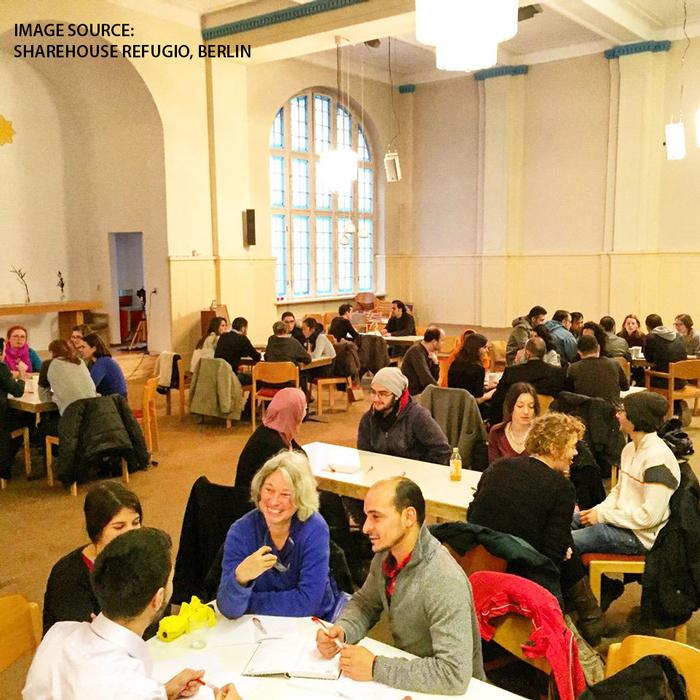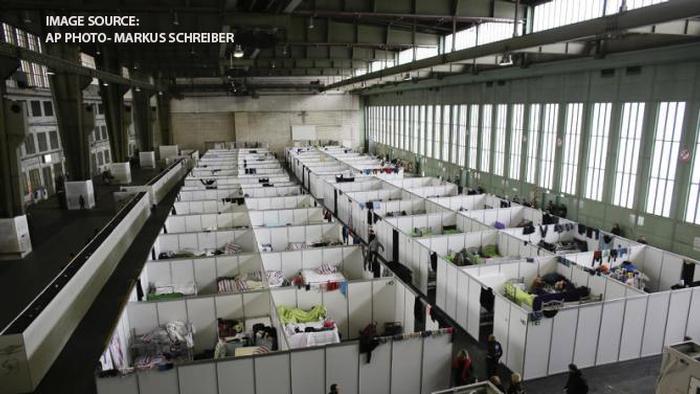Meghana Hegde ProposalSocial integration for refugees in BerlinI remember from a few years ago, reading this book called Heliopolis by James Scudamore and consequently wondering what abandonment and alienation felt like and what I would have done were I to suddenly find myself homeless? I don’t think it’s easy for someone to fathom homelessness unless they have experienced it first-hand. But to comprehend what homeless feels like, one must understand what home stands for. So, WHAT exactly is home? What really defines home in this age of mass movement and rapid communication? A recent conversation with an extremely homesick friend left me introspecting. Home, is so much more than just the materiality of four walls and a roof. I believe home is essentially any place one feels welcome. But in a more permanent sense, there are deeper connotations to ‘home’. It is a physical entity, a space in time, ‘adopted’ as such by an individual. Home is a physical manifestation of our psyche. The idea of home is so intrinsic to an individual’s identity that by extension it affects the social, cultural and mental bearings of that individual. So to be rendered homeless, for whatever reason, entails a deep-seated identity crisis. Such a crisis is further compounded if homelessness is due to external causative factors. War, natural disaster, famine are just a few of the many factors that leave in their wake a large number of homeless people, who are often too shattered to go about rebuilding their lives. The current Syrian crisis is testament to the vagaries of war. According to UNHCR reports, over 4 million people are currently homeless and are in need of shelter. With the scars of war, uncertain futures and their lives hanging in precarious balance, the sort of psychological distress these refugees undergo every single day is unimaginable. While many of the homeless refugees seek asylum in neighbouring countries, their overwhelming numbers and the resulting strain created on social and physical infrastructure has led to widespread opprobrium. Sheltering the homeless in such a contentious situation should be a delicate process which resonates not only with the refugees, but also with their adopted communities. Given the uncertain nature of the end of the Syrian crisis, providing shelter for refugees needs to address the vital issue of assimilating them with their host societies. For refugees in alien countries, cultural and social assimilation with the local residents is a way to harmonize with their adopted society and in a sense to feel at ‘home’. To gain a better understanding of how social spaces can address the psychological needs of the homeless, I would like to attend the Design Build – Community Spaces with Refugees Summer School programme at T U Berlin, which promises to be a hands-on social rehabilitation project. The programme’s aim is to address the need for community spaces felt by refugees in Berlin. The intent of the programme is the realisation of small building projects which would seek to improve the everyday life of refugees in Berlin. The programme is meant for architects, engineers and professionals with some working knowledge of construction practice. The final outcome of the workshop is envisioned to be a functional prototype on site derived from collaboration between the fields of architecture, sociology, civil engineering and landscape design. It would be a tremendous opportunity to experience and implement, first hand, the inferences I have deduced from studying the post earthquake Bhuj rehabilitation process, albeit in a vastly different context. Furthermore, this design project presents an interesting aspect of designing considering the cultural and societal needs of refugees in the juxtaposed cultural context of Berlin. Interacting with and working alongside refugees, TU Berlin faculty, fellow students and professionals who may be from a number of different countries, is another factor which would make this programme a uniquely enriching experience. Already having taken part in a two week design build programme through my college, in collaboration with Curtin University, Australia, I am familiar with quick response design, time management, construction skills and teamwork that such a project calls for. Additionally, having interned for 5 months at a landscape architecture firm in Pune, I believe I can contribute to and learn a lot from such an interdisciplinary exercise. The multi-faceted challenging nature of this programme is extremely enticing and I see myself contributing in my fullest capacity. The course prerequisites are (a) one year of university education and (b) having a certificate for English level B2 or an equivalent examination. I plan to give my English level exam in the month of April, thus allowing sufficient time for the application process. The Summer school is a four week long intensive course starting on July 25th and ending on the 18th of August, 2016. The programme starts off with an orientation and an intensive interview session with the refugees to gain a deeper understanding of the issues they face. This will be followed by live site recces and studies. Upon identification of a viable site, detailed site study and documentation will be conducted. The emphasis laid on pre-design studies highlights the importance the programme lays on contextual user-oriented design. The preliminary studies will be followed by detailed design exercises which will finally culminate in functional design output on site. After construction on site, an evaluation of activities conducted will be an opportunity to reflect and introspect on all that the programme has entailed. The practical nature of the workshop will give me a broader understanding of the psychological needs of the homeless. I hope to come away, a little more sensitised to the issue of homelessness and comfortable place-making. Photographs, sketches and architectural documentation done over the course of my travel will further substantiate my research in this area. My time spent in the city of Berlin will provide me with the opportunity to better understand German history and culture. I hope this exercise will help me be a more sensitive architect and professional in my future career. I really would like to thank the Berkeley foundation for the beautiful platform that they provide. Itinerary Thursday, 21st July – fly to Berlin from Pune; Friday, 22nd July – touchdown in Berlin; 23rd-24th – explore the city and the cultural scene, familiarise myself with the neighbourhood; 25th July to 18th August, participate in the Design-build Summer School; 19th August to 21st August; site seeing in Berlin; Monday, 22nd August – catch a flight from Berlin back to Pune. Budget Round trip ticket Pune, Berlin USD 850 (as of February 2016); Course fees, USD 2056; Stay at local youth hostels @ USD 30/per night for 31 nights, USD 930. Total cost – USD 3836. Expenditure for food and daily commute, medical insurance and liability insurance and other miscellaneous expenses over and above the USD 3700 stipend will be borne by me. Course Details Summer school course: https://www.tu-berlin.de/summer_university/courses/designbuild_community_spaces_with_refugees_in_berlin/ Schedule and syllabus for the Design-build course : https://www.tu-berlin.de/fileadmin/a70100710_summeruniversity/Course_Syllabi/Dec_2015_DesignBuild_Syllabus_pdf.pdf T U Berlin representative: Pablo Rojas, Program Coordinator, TU Berlin Summer University Team, TUBS GmbH Email : summeruniversity@tubs.de phone: +49 30 44 72 02 11
Additional Help and InformationAre you in need of assistance? Please email info@berkeleyprize.org. |
|


